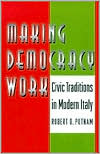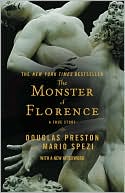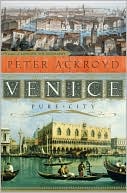Making Democracy Work: Civic Traditions in Modern Italy
Why do some democratic governments succeed and others fail? In a book that has received attention from policymakers and civic activists in America and around the world, Robert Putnam and his collaborators offer empirical evidence for the importance of "civic community" in developing successful institutions. Their focus is on a unique experiment begun in 1970 when Italy created new governments for each of its regions. After spending two decades analyzing the efficacy of these governments in...
Search in google:
Why do some democratic governments succeed and others fail? In a book that has received attention from policymakers and civic activists in America and around the world, Robert Putnam and his collaborators offer empirical evidence for the importance of "civic community" in developing successful institutions. Their focus is on a unique experiment begun in 1970 when Italy created new governments for each of its regions. After spending two decades analyzing the efficacy of these governments in such fields as agriculture, housing, and health services, they reveal patterns of associationism, trust, and cooperation that facilitate good governance and economic prosperity. Publishers Weekly Harvard professor Putnam offers an in-depth examination of Italian politics and government. (Sept.)
List of FiguresList of TablesPrefaceCh. 1Introduction: Studying Institutional Performance3A Voyage of Inquiry3Charting the Voyage7Methods of Inquiry12Ch. 2Changing the Rules: Two Decades of Institutional Development17Creating Regional Government18The Regional Political Elite: "A New Way of Doing Politics"26The Deepening of Regional Autonomy38Putting Down Roots: The Region and its Constituents47Ch. 3Measuring Institutional Performance63Twelve Indicators of Institutional Performance65Coherence and Reliability of the Index of Institutional Performance73Institutional Performance and Constituency Evaluations76Ch. 4Explaining Institutional Performance83Socioeconomic Modernity83The Civic Community: Some Theoretical Speculations86The Civic Community: Testing the Theory91Social and Political Life in the Civic Community99Other Explanations for Institutional Success?116Ch. 5Tracing the Roots of the Civic Community121The Civic Legacies of Medieval Italy121Civic Traditions After Unification137Measuring the Durability of Civic Traditions148Economic Development and Civic Traditions152Ch. 6Social Capital and Institutional Success163Dilemmas of Collective Action163Social Capital, Trust, and Rotating Credit Associations167Norms of Reciprocity and Networks of Civic Engagement171History and Institutional Performance: Two Social Equilibria177Lessons from the Italian Regional Experiment181Appendix A: Research Methods187Appendix B: Statistical Evidence on Attitude Change among Regional Councilors193Appendix C: Institutional Performance (1978-1985)198Appendix D: Regional Abbreviations Used in Scattergrams200Appendix E: Local Government Performance (1982-1986) and Regional Government Performance (1978-1985)201Appendix F: Traditions of Civic Involvement (1860-1920)205Notes207Index249
\ The NationSeminal, epochal, path-breaking: All those overworked words apply to a book that, to make the point brazenly, is a Democracy in America for our times.\ — David L. Kirp\ \ \ \ \ The EconomistA great work of social science, worthy to rank alongside de Tocqueville, Pareto, and Weber.... If [Putnam's] claims about the essential conditions of successful democracy are correct (and they almost certainly are), then politicians and political scientists alike will have to think again about democracy's prospects in Asia, Latin America, and Eastern Europe.\ \ \ The Times Literary SupplementA remarkable study of 'civic traditions.'\ — Steven Lukes\ \ \ \ \ The New York Times Book ReviewIt is rare that one comes across a classic in political science, yet in Robert D. Putnam's Making Democracy Work we undoubtedly have one. . . . Mr. Putnam's seminal work addresses in a rigorously empirical way the central question of democratic theory: What makes democratic institutions stable and effective? . . . [His] findings strikingly corroborate the political theory of civic humanism, according to which strong and free government depends on a virtuous and public-spirited citizenry—on an undergirding civic community. . . . One crucial implication of Making Democracy Work is that feeble and corrupt government, operating against the background of a weak and uncivic society, tends not to foster the creation of wealth, but rather to renew poverty. Overmighty government may stifle economic initiative. But enfeebled government and unrepresentative government kills it, or diverts it into corruption and criminality. . . . This may not, perhaps, be a universal truth; but it is directly relevant to the prospects of democracy in the United States today.\ \ \ \ \ The NationSeminal, epochal, path-breaking: All those overworked words apply to a book that, to make the point brazenly, is a Democracy in America for our times.\ \ \ \ \ The Times Literary SupplementA remarkable study of 'civic traditions.'\ \ \ \ \ The NationSeminal, epochal, path-breaking: All those overworked words apply to a book that, to make the point brazenly, is a Democracy in America for our times.\ — David L. Kirp\ \ \ \ \ Publishers WeeklyHarvard professor Putnam offers an in-depth examination of Italian politics and government. (Sept.)\ \








